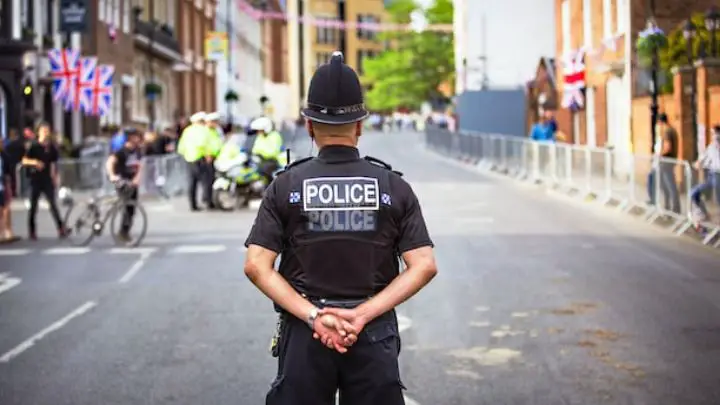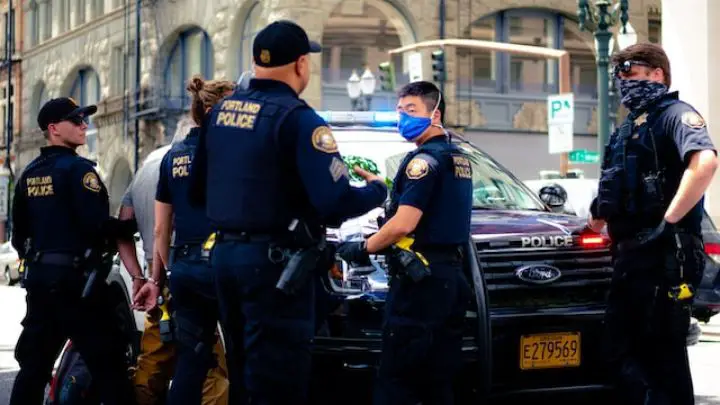Detective vs. police officer: while both professions are somewhat similar, they differ significantly.
On the frontline, police officers serve and protect the people. When a disaster occurs, police officers are the first responders and do everything necessary to save lives.
On the other hand, detectives collaborate with forensic technicians to process the crime scene and collect evidence to aid investigations.
In this article, I will explain what a detective does, how they differ from police officers, and what it takes for a police officer to switch to a detective job.
Who is a police officer?

A police officer is a law enforcer who often monitors public areas for law and safety violations.
Police officers hold the right to issue warrants and make arrests for violations. Also, they respond to emergency calls from the general public regarding issues such as drunk driving, burglary, and so on.
Responsibilities of a police officer
- Patrol designated areas of the community
- Communicate with members of the community
- Regulate traffic
- Help out during accidents
- Help stuck motorists
- Enforce traffic laws
- Issue fines for traffic violations
- Arrest people suspected of crimes
- Respond to 911 calls
- Collect and present crime evidence
- Testify in court about crimes and arrests
- Write reports of crimes and arrests
Who is a detective?

A detective is a high-ranking police officer with additional responsibilities. Detectives are at the forefront of trying to solve crimes.
They have the right to ask questions per police reports to interrogate suspects and victims of serious or violent crimes.
Also, detectives can consult forensic scientists to help uncover certain information about a case. They can also act as expert witnesses and interrogators in legal proceedings.
Responsibilities of a detective
- Analyze crime scenes for further evidence and clues
- Interrogate eyewitnesses, victims, and suspects
- Investigate crimes via questioning and gathering evidence
- Consult with professionals, including forensics
- Follow-up police reports
- Observe suspected criminals
- Arrest criminal suspects
- Go on raids
- Interrogate crime suspects.
- Give evidence in court cases
- Write reports about their findings and investigations
- Prepare charges and get arrest warrants ready for arrests
Detective vs. police officer: what are the differences?
The following are the differences between detectives and police officers:
1. Rank and authority
One of the things that makes a police officer different from a detective is their rank. Often, most police officers get promoted to detectives, so detectives are higher up in the workplace.
In fact, in some places, detectives can tell police officers what to do, and in other places, detectives have a higher rank than police officers but do not have more authority over them.
2. Pay
Both patrol officers and detectives have different salaries. According to Indeed, a police officer’s salary in the United States is about $61,100 per year, while detectives earn around $83,6000 per year.
3. Licencing and Certification
Another difference between a police officer and a detective is the job license. To work as a police officer, you must graduate from a police academy. You will also be trained in first aid and have permits to carry and use guns.
On the other hand, detectives earn extra certifications and training in areas like forensics to conduct advanced investigative tasks.
4. Focus
Even though police officers and detectives share some responsibilities, they have unique focuses.
While a police officer’s primary responsibility is enforcing the law, a detective’s primary responsibility is investigating crimes.
5. Specialization
Another difference between police officers and detectives is that detectives might specialize in investigating certain types of crimes, while police officers cannot.
However, these specializations will require extra training and/or certifications. These specializations include:
- Forensics: During investigations, forensics detectives might zero in on studying physical evidence and data from lab tests.
- Homicide: As a detective, you may focus solely on homicide investigations.
- Fraud analysis: Some private detectives make it their specialty to look into financial crimes like fraud.
- Cybercrime: In the case of computer crimes such as hacking, cybercrime detectives might gather data evidence from digital devices like computers and mobile phones.
- Narcotics: Detectives specializing in narcotics look into drug-related crime and gang activity.
Detective vs. police officer: what are the skills needed?
There may be some variation in the skill sets required of police officers and detectives. The following are the skills needed:
Police officer
- Fitness: Physical fitness can help police officers better deal with potentially life-threatening situations and apprehend criminals.
- Judgment: Good judgment allows patrol officers to address issues and make positive decisions effectively.
- Empathy: With empathy, police officers can better connect with their communities and diffuse uneasy situations.
- Interpersonal skills: Strong interpersonal skills, such as active listening and clear communication, can help police officers build trust with community members.
- Conflict management: Police officers can avoid potentially deadly situations and defuse uncomfortable encounters with the public by employing good conflict resolution capabilities.
Detective
- Critical thinking: A detective needs good critical-thinking skills to comprehend and analyze crime scenes.
- Paying attention to detail: Paying close attention to the smallest details is a key skill for detectives, as it helps them piece together the bigger picture and ultimately solve crimes.
- Problem-solving: Detectives also need good problem-solving skills like analytical thinking, which can help them perform better at work.
- Leadership: Leadership skills can help detectives build trust with crime victims and eyewitnesses to ensure accurate information from them.
Can a police officer become a detective?
Yes, police officers can become detectives when the requirements are met. If you are a police officer interested in moving through the ranks to detective, consider the following steps:
1. Verify your eligibility
Consider reviewing the hiring requirements to ensure that you meet them. General eligibility requirements for detectives include the following:
- Must be at least 21 years old. However, some programs will accept applicants as young as 18.
- Must have a high school diploma or a General Equivalency Diploma (GED). However, some departments require a bachelor’s degree in criminal justice.
- Finally, your experience as a police officer can count toward the experience you need to get hired as a detective. Getting promoted to detective takes about four or five years of experience.
2. Get a Bachelor’s degree
After reviewing the requirements, getting a bachelor’s degree in the field you want to specialize in is the next step. Here is a list of related degrees you can get:
- Forensics
- Criminal justice
- Law enforcement, etc.
3. Get professional certifications
You can also earn professional certifications to increase your chances of becoming a detective in your preferred field. Common certifications include:
- Certified Fraud Examiner
- Certified Crime Scene Investigator
- General Certified Forensic Analyst, etc.
4. Rewrite your resume
Finally, you should review and write a compelling resume highlighting your investigative skills and experience working as a law enforcer.
Your resume should include the following;
- A summary statement proves that you meet all the requirements for the position.
- A brief description of your investigative experience.
- A list of certifications and licenses you have earned.
5. Apply for open positions/promotions
After fulfilling the requirements to become a detective, you can use your newly-written resume to apply for promotions and open positions.
You can find out about job openings in the law enforcement sector by contacting your professional network or by inquiring about openings at your current department.
FAQs
How can police officers prevent crimes?
Police officers can prevent or reduce crimes by identifying specific crises, analyzing, understanding, and making a tailored approach to solve them.
What is the highest position of a police officer?
The highest-ranking officer in the police force is the Chief of Police (COP).
Are the FBI the same as detectives?
No, but they are similar. FBI agents work globally and can be transferred to any state or country. In contrast, detectives mostly stick to investigating crimes in their immediate neighborhoods.
Conclusion: detective vs. police officer
To clarify, every detective is a police officer, but not every police officer is a detective. Detectives have a higher rank than police officers and usually work in different parts of the police force.
Detectives conduct undercover operations to investigate drug trafficking and other illegal activities, while police officers conduct arrests and basic investigations.
However, as a standard practice, most law enforcement agencies require that detectives first serve as police officers for a few years.
Afterward, they graduate from the department’s police academy and later apply to become detectives by passing a promotion exam.
I hope you found this article interesting. You can also read about the dos and don’ts of a probation officer.
Thank you for reading.







